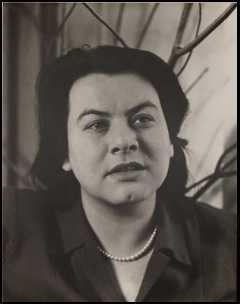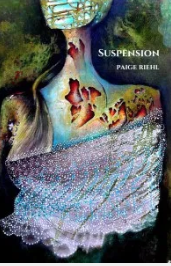Why we chose Suspension by Paige Riehl
Muriel Rukeyser, in her 1949 book of essays, The Life of Poetry, tells us contemporary poetry is important, especially in a climate of divisive political polarization. When contentions and divisions worsen into mass hatred, which shows its ugly face in mass incarcerations, mass killings, wars and genocide, the ability of poets to illuminate the emotional truths of human experience can be, Ms. Rukeyser said, a nonviolent force of liberation. She believed poetry subverts malignant powers that benefit from systemic racism, sexism, classism, and a culture of war.
That poetry can work powerful good in the world, should be good news for those of us who love the art. But as long ago as 1991, Dana Gioia believed poetry was a vanishing cultural force. In the essay Can Poetry Matter?, he suggested strategies that could “make [poetry] essential once more.”
More than a quarter-century ago, Mr. Gioia outlined why 20th-century poetry diminished into an art relevant only to an insular, bureaucratic subculture, offering suggestions on how to awaken general interest in poetry and increase opportunities for poets to be heard. Today, people who read poetry are even more rare than left-handers. It appears that either Gioia’s ideas didn’t work, or maybe people didn’t like what he had to say, and therefore didn’t give his solutions a chance.
Recently Christopher Ingraham claimed poetry is not only unpopular (as it perpetually has been) but now, like polar bears and black rhinos, poetry is going extinct. In an article for The Washington Post, he wrote, “In 1992, 17 percent of Americans had read a work of poetry at least once in the past year. 20 years later that number had fallen by more than half, to 6.7 percent.”
I’m not saying that poets ought to aspire to be on best seller lists. Adam Kirsch, writing for The New Republic in 2014 reminded us that Edgar Guest and Rod McKuen “were bestsellers, but who reads them now?” In the 1970’s Susan Polis Schutz created a line of greeting cards and gift books appealing to popular sentiment. Her schmarmy verse earned her company, Blue Mountain Press, tens of millions annually. Popular poetry, however, is generally as ephemeral as popular fiction. Tell a millennial you’d like to see a Susan Polis Schutz revival, and you’re likely to hear, “Okay, Boomer.”
But if authentic, good poetry is a liberating power, shouldn’t those who self-identify as thoughtful readers want to read it? Why, then, are so few readers, reading poetry?
Almost forty people meet every month at Great River Regional Library (in St. Cloud Minnesota to discuss books of recently published fiction or nonfiction with a staff librarian. After more than five years of meeting, local citizens had read and discussed 60-plus books, approximately 25% of them nonfiction, but not a single volume of poetry was on their list. There’s an assumption it takes an MFA to “get” contemporary poetry.
If their assumption is, as Gioia appears to believe, a result of the professionalization of a specialist audience of poetry readers — “the migration of American literary [and especially poetry] culture to the university” — then it’s time to honor poets who produce work that can be accessible and relevant for ordinary, book-loving, non-specialist readers. This is why Lyricality chose Paige Riehl’s Suspension as the featured book for its “Read Poetry Central Minnesota, 2019” program, in cooperation with Great River Regional Library. Last April, Suspension changed many minds about poetry’s relevance, and launched what we hope will grow into a statewide program with thousands of people all reading and discussing one book of poems every year. In a few weeks, on December 19th, Lyricality will announce Paige Riehl’s selection of 5 finalist books for “Read Poetry Central Minnesota 2020,” each written by a Minnesota poet.
Review of Suspension by Paige Riehl
Paige Riehl’s debut full length book of poems, Suspension, is a rare collection, accessible for non-specialist readers, while also appealing to experienced poetry readers. Laura Kasischke says, “…this is work made mostly of imagery and music, subtlety and unflinching consideration. These are poems to return to again and again, written by a poet of unique powers.”
This collection of poems is an intelligent, even intellectual work of art. Yet these poems are also accessible. Its structure is narrative. Its subjects are domestic—parenthood and international adoption, illness, the self at home and abroad. The voice is warm but matter-of-fact, an authentic midwestern voice. Entering these poems could feel familiar for a heartland audience of uninitiated readers, like the local library book group. It might even help them overcome their “Poem Traumatic Stress Disorder,” the term New Hampshire Poet Laureate Alice B. Fogel uses to describe the step-away reaction poets often get, when they say the word poetry to non-enthusiasts.
While Suspension could advocate for poetry’s relevance beyond its current narrow borders, there is nothing superficial or easy about these poems, which challenge a reader to suspend certainty, to interrogate assumptions in times of not knowing, to probe the liminal spaces of a life. The intellectual dimensions are subtle but searching in this exploration of how both language and gesture mediate human bonds, yet also fail to build the connections we deeply, sometimes desperately, long for. Here we wait, suspended between hope and grief, to learn whether we will be allowed to embrace, or required to release, our loves.
It’s possible to read this collection as a narrative divided into five parts with a dramatic arc.
Suspension, I
Section 1 introduces its subjects and raises an important question about how language works. When do words bridge our divisions, and when do they fail us? What if the best way to approach the unutterable truth of a human heart, is through apophasis, a simple mention of what we will not or cannot talk about?
In matters of love, this poet seems to be inferring, language can sometimes be like trying to see in the dark. We can only detect the elemental nature of a thing if, instead of looking at it straight on, we use our peripheral vision to give it a sideways glance:
the way the birds come just close enough but not exactly to
your outstretched hand, and simply wait
for you to drop the bread.
—from “Apophasis”
Suspension, II
Section 2 of Paige Riehl’s Suspension is something like the rising action of a plot line, carrying readers away from the family and, through memories and yearnings, into the wide world — on the ferry to Milos, in the Teatre-Museu Dali in Figueres Spain, to Germany, and near Chang Mai, Thailand. These journeys set the stage for a return to the domestic question, what would life have been like if you hadn’t settled down? (in “Don’t Say You Haven’t Wondered”). Here we see the marital emptiness that can come after the arrival of children (in “An Illusion of Fullness”). The section ends (in “Wait”) by stripping away illusions, letter by letter, until we are left with a hollowed out, rotting feeling of loneliness, waiting for it to arrive. It will change things. Searching out the implications of these lyrics, we wonder whether in the end, all we really have and know is the insignificant, lonely i.
This poetry probes how our missed and failed connections engender loneliness, asks why our efforts to connect—to love—inevitably become entangled in disconnection and loss.
At home, we create our daughter’s history
and worry her future. Worry her homeland loss.
Worry mother father language culture loss:
Tangled filament woven through brain.
But our love matters too. Yes? Velvet love.
— From “Near Chang Mai, Thailand”
Supsension, III
Section 3 is a like a plot’s turning point. This section is a single long poem from which the book’s title takes its name, “Suspension.” The story centers on a woman in Minnesota, waiting to become physically united with her baby girl, born on the other side of the globe.
Here is what lies between us:
6,221 miles across the earth,
The story also stands as a metaphor for all the disconnections we experience. The questions raised in part 1 are all resolved here, all arriving at the same unsatisfactory answer: “Nothing comprehensible.” We are suspended in the reality of our mortality, where our complete connection—perfect unity in perfect love—remains incomplete.
Here is what really lies between just us,
between our empty arms, our open hearts:
only now, only this waiting.
In the suspension of waiting–which is the now–of life, we come to recognize and accept that the problem of loneliness is unsolvable.
Suspension, IV
Moving into section 4, the reader may experience something like a narrative’s falling action. Here, we encounter dilemmas large and small that hinder the attainment of our goals and desires, beginning with the first poem of this section,”Dragonfly.”
You are soul-weigher, tiny
devil’s horse, doctor
of snakes. You are strength
of late summer, couple-barred
cross of courage and speed,
rendered flightless
with two pebbles
and a string
of child’s hair.
Other singeing images of adversity include daffodils [that] push against the still frozen earth (from “Adoption Webinar”), and (from “Muscle Memory”) the bone and soft tissue / of bunions expanded over decades, and aging feet, which after the corrective surgery meant to heal them, hold muscle memory: the feet ache to defy steel and stitches.
Here we also encounter the powerlessness of humans against the pull of desire. Even our own longings can become adversarial.
It came like a hailstorm,
how we were caught
in the updraft,
breath sucked from our
air-hungry lungs…
—(from “Desire”)
Suspension, V
In section 5 the lyrical speaker of this collection reveals a Dickinsonian awareness of the utter vulnerability of being embodied and human. The “I” of this collection is now in
Deep-celled fear. I am a bag of rags.
Lunch stinks uncollected.
My infected pelvis propagates hurt:
a winding vine twisting to fevered brain.
—(from “Hospital Break”)
Here is the discovered truth, that language, the pride of humanity elevating us above the beasts, is always inadequate to communicate love. Words insufficiently bind us. To one heart-thirsty for love, mere words can be like
…Lightning bolts
in a drought….
To her adopted daughter, this poet offers the deepest of loves through wordless gesture:
I will offer you water
from my cupped hands.
— (from “Post-Adoption, The Naming)
In the denouement, we find the speaker’s commitment to remain alive and present, despite the vulnerability and pain in realizing she cannot promise her children she will always be there to comfort them.
I walk wounded, a curved C.
Yet, I enter my bright kitchen
…
I am here. My son and my daughter
wrap their arms around my waist
again, again, as if
I am not a fevered imprint, as if
I am not a skeleton pencil sketch,
as if I am me and tomorrow
is as certain as the way they run
into the living room, certain
I will be sitting at the table
when they return.
— (from “This is the Hour of Returning”)
Pain and death, too, are also unsolvable problems. To enter uncertainty, attentive to paradox and ambiguity, is to accept a life without answers. And as the poet and Benedictine monastic Mara Faulkner has said, a life without answers, is a real life. Because a life with all the answers, feels like death.
Why add Suspension by Paige Riehl to your reading list
While Suspension by Paige Riehl is accessible to the non-specialist reader, this collection also contains the imagery, the word-music, and the profundity of nuanced thought that experienced readers expect from a skilled poet. A careful reader will discover that here—dancing at the intersection of philosophy, rhetoric, and sociology—is insight.
For anyone who wants to live as the sages and mystics throughout time have advised, present to the only moment we ever have—the now, Paige Riehl’s Suspension is indeed a volume “of rare power.” These poems could make readers realize that to experience life on life’s terms, to encounter reality, we must relinquish our attachments to certainty, nostalgia, and fantasy. To live within suspension, waiting for time and life to unfold, is to exist with awareness. And this is where, despite (or because of) a lack of answers, a life can become richer, more authentic, more meaningful. This, in other words, is how to live a life full “of the meanings of emotions and ideas in their relations with each other, and to understand, in the glimpse of a moment, the freshness of things and their possibilities…” (Muriel Rukeyser).
And this is how poetry can foster the liberated life, which Muriel Rukeyser believed is the antithesis to a diminished life of impoverished imagination and corrupted consciousness.
read more about “Why Poetry Matters”…
My recent conversation with Mara Faulker adds insight into how poetry can foster the humble practice of questioning our own ideas.



